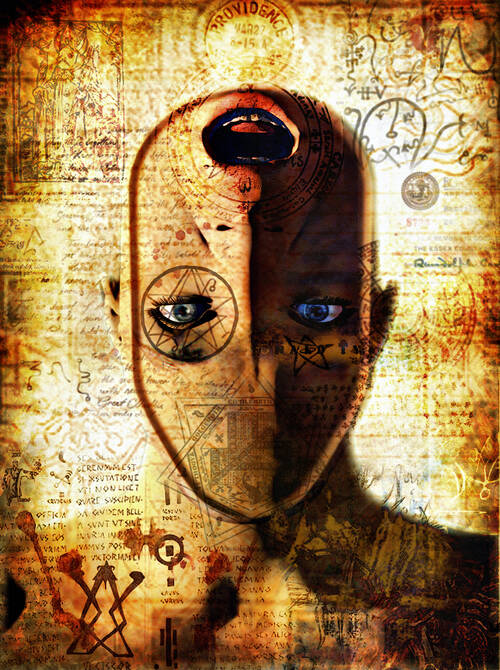The weeks that followed the hell of events that took place in the part-time therapy were tough. I very quickly reached my limit in everything I did. I could no longer do all the things I loved doing when I left the clinic. I still really wanted to, but the fear was just too great. Every time I tried to use my strength/aggression to do something, I was immediately overcome by fear. And it had never been so strong. I couldn’t do anything, or I became anxious. And the fear had grown steadily during the therapy and occurred faster and more intensely, because I was put under so much pressure during the therapy. It suppresses the aggression. So my aggression was not allowed to exist when I left the part-time therapy. And an important part of identity is precisely that your own feelings (including anger) are allowed to exist. I felt like I didn’t belong and there was nothing unique about me. I let everything wash over me. The fear was endless and much bigger than my own strength. It was now important that I received guidance so that I could recover. I had a meeting with the Mental Health facility to see what they could do for me. It was decided that I should go to the RIC (Reintegration Center of the Mental Health facility). It was decided that I should go by part-time, because I was managing reasonably well at home with my parents. We were no longer fighting, I had long since given up. I would come for a few hours three times a week. Rina became my personal counselor. When I first came for a few hours, I was surprised that there were no therapies. It was just a house where psychiatric patients lived. And I saw more people who were having a hard time and doing nothing. I absorbed all their feelings, and it didn’t make me feel any better. I hated being so down, but I was able to make contact with the people who lived there fairly quickly, which made them seem less scary. But I was also incredibly anxious and didn’t trust many people. Especially not the counselors. My trust in them had dropped to zero. What’s more, they still had to get to know me, and because of that they often said things that were not true. This caused me to be at war with them in my head. I told them what therapy processes I had gone through and how much I had felt that my aggression was frowned upon in that part-time therapy. For a long time I had the idea that they did not understand how I was put together, and that they thought I was just a spoiled and spiteful little boy who finally had to grow up, as if that is more important than feeling good about yourself. They were so proud of their own blinkered maturity that they compulsively wanted to make everyone around them grow up too. During my first time at the RIC, I was disgusted by everything and everyone, and I regularly found myself secretly retching. Desmond and Anke, my therapists at the clinic, always wanted to fuel our aggression, so Desmond once asked, “What feeling is behind your disgust?” To which he gave the answer himself: “Murderous rage!!!” and I completely agreed.
I quickly focused on doing relaxing activities, because I really needed to, and I couldn’t do much more than that because of the great fear. I kept repeating that I wanted to do things, something that was emphasized a lot in the part-time therapy in the last few months, and I really wanted to comply with this. They thought that my aggression could then exist in a more constructive way, but that wasn’t true. It was using your agression to fight against the people that hurt you, as they taught me in the clinical therapy, or succumbing to the pressure and losing all strength for ever. No middle path was possible with what I’d been through. For some activities I was registered at a day activity center of the Mental Health facility. I would go to the fitness center once a week and play badminton once a week. I actually did this on autopilot for a while. I didn’t enjoy it. In fact, I didn’t enjoy anything. I was very preoccupied with death and sometimes wished for it, just to be put out of my misery, and this thought kept coming back very compulsively. Now I understood Chris, now I understood Michael, now I understood Sanne (Lieke’s deceased sister (Lieke was the friend who had been to Barcelona with us)). They had just felt so incredibly bad and had had so little hope that things would get better that death seemed the only option. Fortunately, I was able to resist my thoughts long enough to avoid doing anything impulsive.
The end of the year was approaching and a letter from the Employee Insurance Agency (UWV) arrived in the mail. I would soon be reassessed. I decided to go there alone, which was a stupid action. During the interview I played it cool, as I always did, and did not want to reveal my limitations. I let myself be led by the doctor with whom I had the interview and did not dare to contradict him. And then I was declared fit for work, which made my heart skip a beat. Because that meant the loss of my income and on top of that I now had to find a job. It was impossible and luckily I had good support from home and from Rina. We decided to object to it. I had gone to this hearing with my parents and Rina. And my father had written down what he thought about it, and became emotional. He said that I was suffering, and that it was impossible to expect me to go to work under such pressure, after everything that had gone wrong. My mother agreed. Rina also shared her perspective on the matter. And this time I shared how much anxiety I was suffering from. And in the end my objection was honored and I was declared fully unfit for work. I was very relieved. However, the people from the UWV wanted a report of my part-time therapy, and Rina went to ask Eelco de Smet for it. I ended up reading that report and I hated it! The report constantly pointed the finger at me, saying that I had aggressive fantasies at the beginning, that I split, that I react aggressively to criticism, that I constantly break contact and so on, that I am passive and do not seem to grow. Nowhere did it state what the therapists had done to get me to the point where I was totally destroyed. And nowhere did it show that they understood how the situation had arisen. They only said that I was too vulnerable to continue. Nowhere did it say that they were responsible for exposing this ‘vulnerability’. (That word sounds as if it is an acceptable state of being, but it is not at all). I told Rina about this, and she said that Eelco had spoken of a vulnerability, to which she had said: “Yes, but it is a very serious vulnerability!” to which he admitted that he had made a wrong assessment, although I sometimes doubt whether he really made an assessment at all, or simply relied on the findings of my psychiatrist Desmond at the clinic, who had written the referral letter, and only mentioned being twins as the most important cause. Rina also said that Eelco offered to talk to me a few more times about it, but I still felt so bad that I didn’t want to take him up on his offer. Besides, I didn’t trust him at all. I had the distinct impression that he had tried to cover up the mistake; that he had kept all his fellow therapists in the dark and told them nothing about it in order to save his own skin; that he had no idea what this mistake had meant to me. And I already had a clear picture in my head of what would happen in those proposed meetings: I would not be able to defend myself - because my distrust and anger were so enormous that I would love to preach to him for 30 minutes with just one sentence, but I would not be able to do it - and he would constantly defend himself, and in my opinion he had no right to do so! What I noticed with Rina was that she rarely mentioned the mistake that had been made. I would have preferred it if she had shown more understanding. It seemed as if she wanted to protect Eelco. But I could be wrong.
The months that followed were difficult, but true to my commitment to following my therapies, I also faithfully attended the RIC. And I gradually got used to everyone. I always tried to talk to new people right away, so that I could get to know them and they could get to know me. I still didn’t feel at ease, I was still too anxious for that. I had a conversation with a psychiatrist, Henk de Koning. It was bizarre. He was very quick to judge. And I didn’t contradict him and played nice again. He said, “So you’ve been in therapy for two years, and it hasn’t helped,” not knowing that I had been tossed back and forth between extremes, and it had indeed had a major impact on me. He also wrote in his report (I later heard this from his successor, Dr. Blankenberg) that he saw no signs of anxiety or depression. Once again, I proved that I was very capable of deceiving, unintentionally. I couldn’t help it. I couldn’t bring myself to show my true self at those moments. Because I gained a lot of weight from Zyprexa, the antipsychotic I was taking, and my cholesterol was too high, it was decided to try another medication. Dr. Blankenberg thought of Orap, a somewhat older medication. I tried it, and it didn’t work. I couldn’t tolerate the medication. It caused more mental pain, as it were, causing my aggression to leap from my legs to the surface to dampen the painful feelings, but it also got pushed back down to my toes, due to how I now was. This made it almost impossible for me to sit still and I constantly wanted to flee (akathisia). It also made me very stiff, and I walked down the street like a Parkinson’s patient. And the strangest thing was that one evening my hand went all the way inwards, I seemed spastic. The pharmacy manager was called late at night to see if she had a remedy for the side effects, and she went to the pharmacy especially for me. Fortunately, this medication provided immediate relief. Later, at the psychiatrist’s, we decided to switch to Risperdal, a medication I was given at the end of the part-time therapy when the increase in my antidepressant Efexor did not sufficiently help against the anxiety, but which worsened the symptoms, as a result of which I was then given Zyprexa. Anyway, I was going to try it again now. The fears increased again; I had a whole list of fears at that moment (death and destruction), but Blankenberg assured me that it was temporary and that things would get better. And that was true, but I was not yet at the same dose as with Zyprexa. Things went well for a while, but unpleasant things did happen now and then, which of course had an exaggerated and traumatic effect on me, causing me to deteriorate and the anxiety became so great at one point that it was almost unmanageable. I discussed this with Rina, and she wondered if it would be better if I came to live at the RIC so that I would have more structure. But I didn’t like the sound of that, and I wondered if Risperdal could be increased to the dose equivalent to Zyprexa. And they agreed. And that helped me a lot. But I can’t imagine what it would be like if I didn’t have those medications.
Eight months after it went so wrong, I wrote a letter to Anke, my therapist from the clinic. In this letter I tell what happened, how I feel, and I tell about my own ideas on whether I can still be helped. In my opinion, there was only one therapy that could still help me, and that is a therapy in which the aggression would be brought to the surface again, the same therapy that I had already gone through once, there in the clinic. A therapy that someone only undergoes if there is nowhere else to go to for therapy. But I also mention that I feel that is no longer possible because I have a defense mechanism (just like Dick, who Anke also knew) that ensures that the aggression can no longer be brought to the surface, the same thing she described when she stopped Dick’s therapy. I ask her for advice and tell her that she was like a mother to me at the clinic and that I really appreciated that. I did not receive a reply to this letter. It remained very quiet. A few months later, I heard from a former therapy friend that Anke had not worked for a few months and that she was now back. I am still convinced that she received my letter, was very shocked by it and took responsibility for it, because I know that she is a very responsible person and that what happened to me is close to her heart. She treated and experienced me intensively during that year, and she saw me grow and she was concerned about me. Partly due to her error in judgment, I was referred to part-time treatment. I forgive her for this 100%, because although she could be very tough, I also got to know her as someone with a big heart for her profession, a great deal of specialized knowledge and very capable in her role, but also incredibly committed to her patients. And I feel that she accepted me unconditionally when I had discovered myself, with all the negative points that came with it. Because outside of therapy I was busy, quick to anger, demanding a lot of attention (although I could share attention), and was demanding, but now I know that I needed this to keep myself together. And what I liked so much about her was that she was clear and said what was and wasn’t acceptable, and that she clearly set boundaries when she felt the need to. In short: a wonderful woman who helped me a lot! In the meantime, I slowly started listening to the music I used to listen to when I was at the clinic. It was very painful that I could no longer sing along properly, because you have to feel good about yourself to sing along to those rock songs. You use all your muscles, especially in your face, and I no longer felt comfortable in my own skin and had lost control of many of the muscles in my face. I was also split inside, so my vocal range was now very different inside than it had been before due to my changed personality. The core that had sunk into my body was my true self, and it felt as if my vocal range was still at that level. When I sang a note, it always came out a few notes lower than I had guessed, very strange, in short: as if my vocal range now was controlled by my split off new self, which wasn’t authentic at all. These two parts of myself (the not authentic and the authentic self) were constantly present together, but they did not work well together. I later learned to correct this when singing, but it does bear witness to the fact that it is all about frequencies, the frequency of your personality, which influences the vibration frequency of your voice.
I particularly reflected on the song Childhood’s End from the Misplaced Childhood album by Marillion. I don’t know what this song meant to the singer Fish, but for me it was about growing up. About finding direction for your childlike inner aggression, and realizing that as you grow up, you find direction for these feelings and that they remain with you as you grow up, that you can still be a child, even though you have grown up, through all the heartache you have suffered. Of course, I completely lost this child in the part-time therapy, but through this song I could see the alternative: how it should have been, and how it is for most people when they become adults. That they manage to retain their inner child. That gave me strength.
Now back to how things went for me in the years after it went wrong. For at least another two years, I was preoccupied in my head with the therapists from the part-time therapy. What they had all said to me, how I should see it, I was fighting with them all the time in my head, just as I fought with the counselors from the RIC in my head. I thought about what they would say if I were angry. And based on their reaction, I came up with a defense. All of this took place in my head because it was impossible for me to do so in real contact. The fear would be too great and so would the risk of further damage. To be able to defend myself properly, I had to think at the therapists’ level, about how I thought I was put together, how the treatment should have been, what they should not have done, and so on. To do this, I tried to think as logically as possible. After my letter to Anke, to which I heard nothing, I also started to remember things that had been said in contact with her. I suddenly remembered the important conversation somewhere at the end of my therapy – which I discussed earlier in my story – where we talked about the anxious feelings that followed the aggressive fantasizing, and in which Anke asked if it was fear of disapproval or fear of not being seen. I realized then that I was afraid of both things, but that I hadn’t told her about this fear of disapproval because I pretended to be stronger than I was and was unconsciously ashamed of it. I felt incredibly responsible for this and thought that she had sent me to the part-time treatment program based purely on this answer, but then I realized that she had already had certain ideas about how things had gone in my family, partly due to the systemic conversation we had had, and that the responsibility lay with her and Desmond, even though I had played a part in this myself. Perhaps it would have been better if we had planned another systemic interview at the time to discuss things properly with my parents present. But I’m afraid that my father did not dare to confess how he had treated us. However, if he had done so, things would have turned out very differently for me. The fact that my sister did not participate in the systemic interview also did not do me right, because at that moment it was much clearer to see that my sister was afraid of being destroyed than it was with me or my brother. But unfortunately this was overlooked.
It was extremely important to me that I was seen properly at the RIC, but I did not yet have the impression that I was always properly understood. I had clearly stated that I was in my aggression after the clinic and that I had learned to handle it well with strict behavioral therapy. But when I repeated this later, Rina said: “Yes, but you were too strong then!” to which I laughed out loud in utter disbelief. But such comments hit home, because what was clear to me was that even though I was in psychiatry, there was less specialized knowledge here about my problems and what kind of therapies I had undergone, and that it is justified for severely traumatized patients to have aggressive fantasies. It’s often the only life that’s left in them. Fortunately, the calmer I became, the more understanding I felt I was getting. Because Rina later realized that my aggressive fantasies had kept me going. And that made me feel good. And so there were other things that happened at the RIC that I had struggled with at home, but I didn’t dare to discuss them because I already had a clear idea of what would be said, and those were definitely not words of understanding. I imagined that I would be bombarded with buckets of shit for which I had no defense.
But time passed and I began to get a clearer picture of everything. This allowed me to defend myself better in my internal battles. And that was important, because it meant that the psychotic feelings and extreme fear also diminished (temporarily). I could slowly start to see the good in people again, as it were. And then I thought it was time to write a letter to Eelco de Smet too, in which I wanted to make it clear to him how damaged I was. It wasn’t an angry letter, because I didn’t dare to write that. I was afraid that if I showed my anger, he wouldn’t read my letter all the way through. So it was a tame and rational letter. But I did make it clear to him how I felt before the therapy and how I felt after the therapy. And what a world of difference this was. But I didn’t hear anything back about this letter either, so my image of Eelco, which I described earlier, unfortunately didn’t really change.
At home I sought distraction by regularly visiting the parents of the deceased Chris, Tiny and Douwe, who were a hoot to be with. That did me good. And I also regularly hung out with their daughter Aukje. I regularly took photos of Tiny and Douwe’s garden during their Open Garden Days, something I did for years. Always super nice, and they visibly enjoyed it when friends of Chris’s came by, as well as when I or my sister Lauren came by. With Douwe I occasionally went to a course or a photo meeting! And that was always a lot of fun! When Douwe and I went on a cooking course with Aukje’s husband, the intellectual level also dropped considerably. Once Douwe spilled almost an entire packet of sugar, which he then swept under a cabinet for lack of a broom and dustpan. And more of those mischievous pranks, which was perfect for me to put into perspective the things that were going on inside me.





